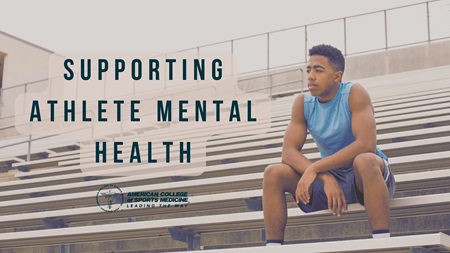Stacy L. Gnacinski, Ph.D., CMPC, CSCS |
Feb.
9, 2022

It has been remarkable to witness high-profile athletes advocating and educating the public about mental health support needs in elite-sport environments. In both National Collegiate Athletic Association (NCAA) and Olympic settings, I have observed transparent efforts to bolster support for mental performance consulting services and/or mental health resources over the past 5-10 years. It is becoming increasingly common to see certified mental performance consultants (CMPCs) or licensed psychologists listed on support staff rosters for teams and organizations. For most teams and organizations, the benefits of increased athlete mental performance and health resources are two-fold: (a) healthy athletes with decreased susceptibility to injury/illness and (b) top-performing athletes and teams (e.g., improved interpersonal dynamics, intensity regulation).
In an ideal scenario, athletes have access to such services well before the lead-up to milestone events such as the NCAA tournament, Olympics, or state championships. Much of the effectiveness of psychological servicing is dependent on the relationship built with the athletes: Any prior rapport or work conducted going into milestone events allows for more effective well-being or mental health intervention during those key events.
When working with athletes at events and/or in the daily training environment, the Olympic Winter Institute of Australia utilizes a “4-Rs” approach to athlete mental health and well-being support: Recognize, Reach out, Refer and Remain supportive. For those readers seeking to improve their skills in mental health support, several suggestions are provided below for each “R.”
Recognize
A key step in athlete mental health support is recognizing the signs and symptoms — or signals — that an athlete may be struggling. One way to improve recognition is to become trained in mental health first aid, which is available in many areas of the United States. Additionally, I would encourage professionals to review the sport-specific resources compiled by the Association for Applied Sport Psychology (AASP), the NCAA, and the National Athletic Trainers Association (NATA). When in doubt, professionals can always consider connecting with a local mental health professional and/or team representative in the psychological servicing space (e.g., CMPC) to confidentially discuss your observations or concerns.
Reach Out
It has been my observation that professionals can sometimes be hesitant to reach out to athletes who may be struggling (e.g., persistent depressed mood, displaying uncharacteristic behaviors for themselves), usually for fear of not knowing what to say or perhaps fear of saying something that could make the situation worse. If you notice an athlete struggling, the following suggestions may be a good place to start:
-
Think about the timing and setting of your intended conversation. Plan to approach the athlete at a low-stress or noncritical moment in time, and choose a setting that offers some privacy and safety for the athlete.
-
Convey that you have noticed they haven’t been their typical self, you care, and you are happy to listen if they would like to talk.
-
Convey that if they are struggling, resources are available and they do not have to struggle alone. Let them know you are happy to make a referral if and when they are ready to talk to a professional. Depending on the sport environment, this could look like walking the athlete to the counseling center or simply providing them with names/contact information of mental health professionals.
-
Let them know that everyone has to take care of their mental health, and it is ok to need assistance in this area. If an athlete had a compound fracture, certainly others would point out that they should seek help from a professional. It is no different with our brains — mental health is health.
Refer
Consult any organizational policies regarding mental health referrals, and consider using a decision-making tree for determining referral appropriateness. Have a list of professionals who fit various types of mental health needs (e.g., disordered eating, anxiety, LGBTQ, depression, life transitions, grief/loss). Whenever possible, do as much vetting of these professionals as possible prior to referring an athlete. Ask the athlete if they have any preferences in the type of person they would like to see, such as gender, ethnicity, age, training, etc. This simple pre-referral step can prevent potential negative experiences for the athlete. Likewise, considering the accessibility of various providers relative to the athlete’s ability to pay for services (e.g., private insurance coverage, out of pocket expenses, Medicaid coverage) can reduce barriers to seeking help. Familiarize yourself with the various types of professionals who may be appropriate for a particular referral. In preparation for the most serious of referral concerns, have a plan in place for a mental health emergency before one occurs.
Remain Supportive
Once a referral or handoff in services has occurred, following up with the athlete helps to normalize the process of seeking help. Additionally, staying connected with the athlete after referral can help reduce any anxiety or hesitation upon transitioning back in to the training or competition environment.
Additional Resources:
Video | Mental Health Awareness Month: Supporting Athlete Mental Health During the COVID-19 Pandemic
Video | Preventing & Recognizing Disordered Eating Behaviors
Website | R U Ok?
ACSM Statement | The American College of Sports Medicine Statement on Mental Health Challenges for Athletes
Winter Games | A Collection of Resources
 Stacy L. Gnacinski, Ph.D., CMPC, CSCS is an assistant professor at Drake University in Des Moines, Iowa. She completed both her master’s of science (M.S.) in kinesiology and doctorate in health sciences (specializing in sport psychology) degrees at the University of Wisconsin-Milwaukee. Outside of her university work, she engages in her private practice as a certified mental performance consultant (CMPC) and is in the process of completing her M.S. degree in clinical mental health counseling at Drake University. In February 2022, she served on the ground as a CMPC for the Australian Winter Olympic Team at the Winter Olympic Games in Beijing. Dr. Gnacinski also holds a CSCS certification with the National Strength and Conditioning Association (NSCA), a corrective exercise specialist (CES) certification through the National Academy of Sports Medicine (NASM) and the FMS Level 1 certification through Functional Movement Systems, Inc.
Stacy L. Gnacinski, Ph.D., CMPC, CSCS is an assistant professor at Drake University in Des Moines, Iowa. She completed both her master’s of science (M.S.) in kinesiology and doctorate in health sciences (specializing in sport psychology) degrees at the University of Wisconsin-Milwaukee. Outside of her university work, she engages in her private practice as a certified mental performance consultant (CMPC) and is in the process of completing her M.S. degree in clinical mental health counseling at Drake University. In February 2022, she served on the ground as a CMPC for the Australian Winter Olympic Team at the Winter Olympic Games in Beijing. Dr. Gnacinski also holds a CSCS certification with the National Strength and Conditioning Association (NSCA), a corrective exercise specialist (CES) certification through the National Academy of Sports Medicine (NASM) and the FMS Level 1 certification through Functional Movement Systems, Inc.